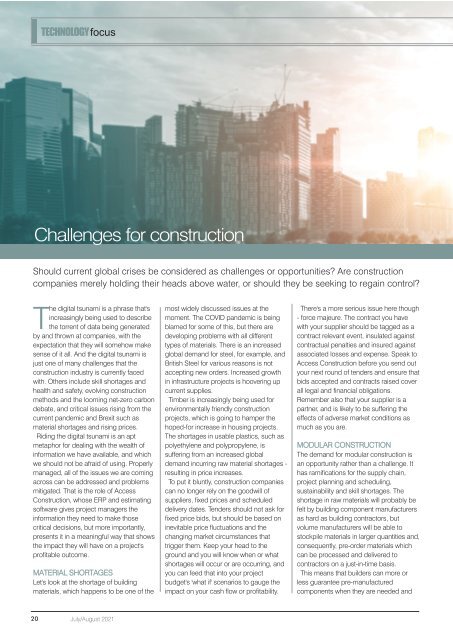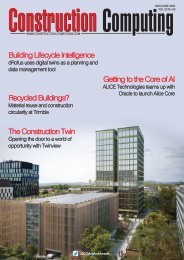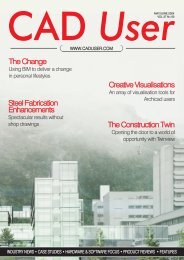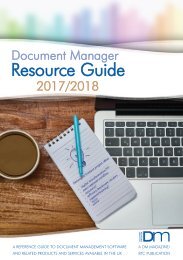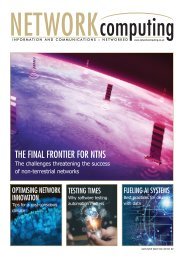Create successful ePaper yourself
Turn your PDF publications into a flip-book with our unique Google optimized e-Paper software.
TECHNOLOGYfocus<br />
Challenges for construction<br />
Should current global crises be considered as challenges or opportunities? Are construction<br />
companies merely holding their heads above water, or should they be seeking to regain control?<br />
The digital tsunami is a phrase that's<br />
increasingly being used to describe<br />
the torrent of data being generated<br />
by and thrown at companies, with the<br />
expectation that they will somehow make<br />
sense of it all. And the digital tsunami is<br />
just one of many challenges that the<br />
construction industry is currently faced<br />
with. Others include skill shortages and<br />
health and safety, evolving construction<br />
methods and the looming net-zero carbon<br />
debate, and critical issues rising from the<br />
current pandemic and Brexit such as<br />
material shortages and rising prices.<br />
Riding the digital tsunami is an apt<br />
metaphor for dealing with the wealth of<br />
information we have available, and which<br />
we should not be afraid of using. Properly<br />
managed, all of the issues we are coming<br />
across can be addressed and problems<br />
mitigated. That is the role of Access<br />
Construction, whose ERP and estimating<br />
software gives project managers the<br />
information they need to make those<br />
critical decisions, but more importantly,<br />
presents it in a meaningful way that shows<br />
the impact they will have on a project's<br />
profitable outcome.<br />
MATERIAL SHORTAGES<br />
Let's look at the shortage of building<br />
materials, which happens to be one of the<br />
most widely discussed issues at the<br />
moment. The COVID pandemic is being<br />
blamed for some of this, but there are<br />
developing problems with all different<br />
types of materials. There is an increased<br />
global demand for steel, for example, and<br />
British Steel for various reasons is not<br />
accepting new orders. Increased growth<br />
in infrastructure projects is hoovering up<br />
current supplies.<br />
Timber is increasingly being used for<br />
environmentally friendly construction<br />
projects, which is going to hamper the<br />
hoped-for increase in housing projects.<br />
The shortages in usable plastics, such as<br />
polyethylene and polypropylene, is<br />
suffering from an increased global<br />
demand incurring raw material shortages -<br />
resulting in price increases.<br />
To put it bluntly, construction companies<br />
can no longer rely on the goodwill of<br />
suppliers, fixed prices and scheduled<br />
delivery dates. Tenders should not ask for<br />
fixed price bids, but should be based on<br />
inevitable price fluctuations and the<br />
changing market circumstances that<br />
trigger them. Keep your head to the<br />
ground and you will know when or what<br />
shortages will occur or are occurring, and<br />
you can feed that into your project<br />
budget's 'what if' scenarios to gauge the<br />
impact on your cash flow or profitability.<br />
There's a more serious issue here though<br />
- force majeure. The contract you have<br />
with your supplier should be tagged as a<br />
contract relevant event, insulated against<br />
contractual penalties and insured against<br />
associated losses and expense. Speak to<br />
Access Construction before you send out<br />
your next round of tenders and ensure that<br />
bids accepted and contracts raised cover<br />
all legal and financial obligations.<br />
Remember also that your supplier is a<br />
partner, and is likely to be suffering the<br />
effects of adverse market conditions as<br />
much as you are.<br />
MODULAR CONSTRUCTION<br />
The demand for modular construction is<br />
an opportunity rather than a challenge. It<br />
has ramifications for the supply chain,<br />
project planning and scheduling,<br />
sustainability and skill shortages. The<br />
shortage in raw materials will probably be<br />
felt by building component manufacturers<br />
as hard as building contractors, but<br />
volume manufacturers will be able to<br />
stockpile materials in larger quantities and,<br />
consequently, pre-order materials which<br />
can be processed and delivered to<br />
contractors on a just-in-time basis.<br />
This means that builders can more or<br />
less guarantee pre-manufactured<br />
components when they are needed and<br />
20<br />
<strong>Jul</strong>y/<strong>Aug</strong>ust <strong>2021</strong>


